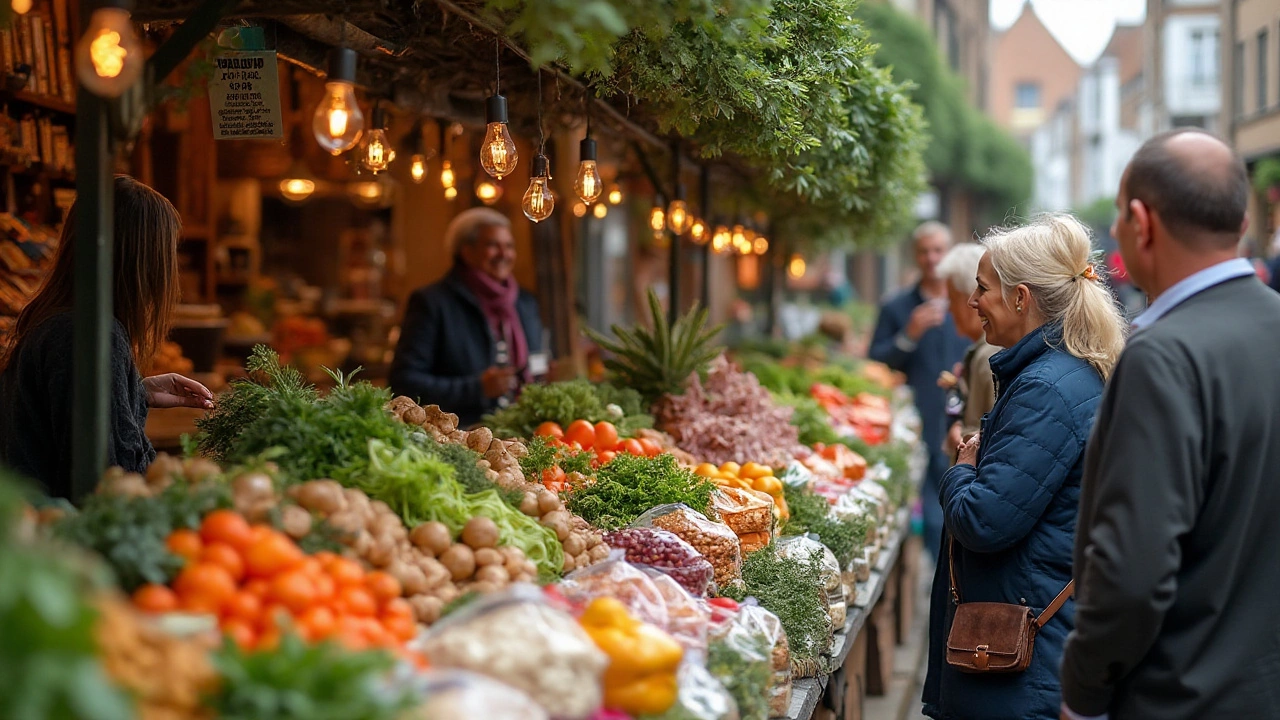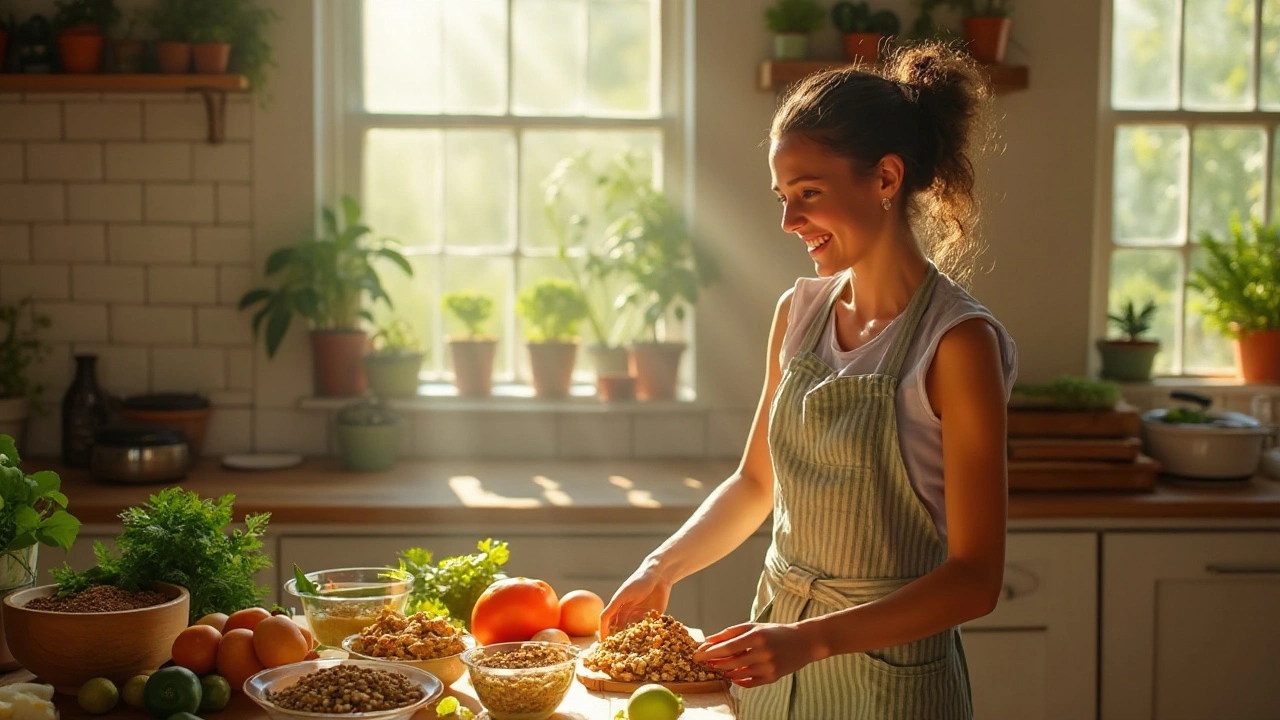Many wonder how vegetarians meet their protein needs without consuming meat, but the answer is simpler than it seems. Vegetarian diets can be abundant in protein, thanks to a variety of plant-based foods that are both delicious and nutritious. Plant proteins not only fulfill dietary requirements but also offer other essential nutrients.
In the following sections, we’ll explore diverse protein sources like beans, lentils, nuts, seeds, and whole grains, which are staples in any vegetarian pantry. Whether you’re a seasoned vegetarian or just dipping your toes into a meatless lifestyle, it’s important to know how to incorporate these power-packed foods into your meals.
- Understanding Plant-Based Proteins
- Beans and Legumes: Staple Protein Sources
- Nuts and Seeds: Tiny Packages of Power
- Whole Grains: More Than Just Carbs
- Creative Vegetarian Recipes Packed with Protein
Understanding Plant-Based Proteins
When the topic of proteins arises, especially in a vegetarian context, people often ask how it is possible to maintain the necessary intake without animal products. In essence, plant-based proteins are not only viable but also incredibly diverse in scope and structure. The key distinction here is that while animal proteins contain all essential amino acids our body needs in what's considered a 'complete' protein form, many plant proteins typically lack one or more of these amino acids. Nonetheless, this does not mean vegetarians are at a disadvantage. On the contrary, by consuming a variety of plant-based foods throughout the day, one can easily make up for these differences. The theory of 'protein complementation' comes into play, where combining foods like rice and beans ensures receipt of a complete protein profile. This opens up a meaningful array of culinary possibilities while ensuring nutritional balance.
In the realm of vegetarian protein sources, legumes like lentils, chickpeas, and beans stand strong, offering abundant proteins while also providing essential fibers and minerals. Notably, soybeans and products derived from them, such as tofu and tempeh, are classified as complete proteins. This makes them exceptionally valuable staples in a vegetarian diet. Research consistently highlights the health benefits associated with plant-based diets, which are linked to lower risks of heart disease and certain cancers.
According to Walter Willett, a nutrition expert at Harvard T.H. Chan School of Public Health, 'Diets rich in plant-based foods and comparatively lower in animal-based foods confer both improved health and environmental benefits.'It’s not just about filling nutritional gaps but about finding opportunities for creativity and variety in meals.
Learning more about the composition of these proteins highlights the importance of doubling down on beans, legumes, whole grains, and nuts, which all contribute their own unique benefits. Within whole grains, quinoa stands out as a prominent example of a complete protein. Not only does it bring a pleasant texture and flavor to dishes, but it also packs a protein punch that rivals many animal-based sources. Other ancient grains like farro, barley, and spelt further round out the category, each adding their own distinct taste and nutritional profile. Coupled with regular intake of different nuts and seeds such as almonds, chia seeds, and flaxseeds, anyone can seamlessly integrate complete amino acids into their diet. This approach to mindful eating not only aids vegetarians but also those seeking sustainable and healthful lifestyles.
| Food | Protein per 100g |
|---|---|
| Lentils | 9g |
| Chickpeas | 19g |
| Quinoa | 14g |
| Tofu | 8g |
In conclusion, embracing a variety of plant-based protein foods can not only satisfy dietary protein requirements but also enhance the palate with numerous textures and flavors. As vegetarians, realizing the potential within the legumes, grains, and nuts we consume allows for a diet that is as enriching as it is nourishing. The choices may sometimes seem overwhelming, but understanding the versatile nature of plant-based alternatives simplifies the journey to nutritional wellness.

Beans and Legumes: Staple Protein Sources
When it comes to vegetarian protein sources, beans and legumes hold a prominent place. These powerhouses are not only incredibly rich in protein but also versatile and affordable, making them a staple in many vegetarian diets across the globe. From lentils to chickpeas, they are packed with not only protein but also vital nutrients like fiber, iron, and B vitamins, which are essential for maintaining a balanced diet. Known for their ability to blend into various dishes, beans and legumes can fit seamlessly into cuisines from different cultures, providing endless culinary adventures.
Consider lentils, which are beloved by many vegetarians for their earthy flavor and impressive nutritional profile. A single cup of cooked lentils contains around 18 grams of protein along with significant amounts of dietary fiber, which aids in digestion and helps maintain stable blood sugar levels. The same serving also brings a plethora of minerals to your body, including iron and folate, both crucial for energy production and overall health. What's more, lentils cook relatively quickly, making them convenient for weeknight meals, whether tossed into salads, stirred into soups, or transformed into hearty dishes like lentil loaf.
Chickpeas, also known as garbanzo beans, have been cherished in Middle Eastern cuisine for centuries and have become a global favorite. These round, buttery legumes offer around 15 grams of protein per cup when cooked. They are the star ingredient in hummus, an internationally-loved dip, which can boost your protein intake while giving you a delightful snacking option. Chickpeas are incredibly adaptable and can be the backbone of a wide array of dishes, from aromatic curries to roasting them for a crunchy snack. Their high protein content, combined with ample fiber, makes them a satisfying and nutritious part of any vegetarian meal.
Black beans, a staple in Latin American cuisine, are another excellent source of protein. With about 15 grams per cup, these legumes are teeming with nutritional benefits, including high fiber, potassium, and an array of phytonutrients that promote good health. Black beans marry beautifully with spices, making them perfect for tacos, burritos, or simply served over rice with a sprinkling of cheese and avocado. Their robust flavor and meaty texture make them an excellent substitute for protein in traditional meat dishes, offering vegetarians and ever-curious cooks a chance to explore new flavors while meeting their dietary needs.
As the renowned food activist Michael Pollan once suggested, "Eat food. Not too much. Mostly plants." Including beans and legumes as part of a plant-based diet embodies this philosophy beautifully. They provide a nourishing alternative to meat while supporting environmental sustainability; growing beans and legumes generally require less water and fewer resources than raising livestock. As you explore the vast world of beans and legumes, you not only enrich your diet with essential nutrients but also partake in a culinary tradition that spans across cultures and centuries.

Creative Vegetarian Recipes Packed with Protein
Stepping into the kitchen with the idea of whipping up a protein-rich vegetarian meal doesn't have to be a daunting task. On the contrary, it's an exciting culinary adventure. From spicy chickpea and avocado sandwiches to the warming embrace of red lentil soup, the world of vegetarianism is brimming with delectable and nutritious possibilities. Emphasizing meal diversity is crucial, not only to keep things interesting for your palate but also to ensure you are getting a wide range of nutrients your body needs.
Let's dive into a wonderful protein-packed breakfast option, the tofu scramble. This vegan alternative to scrambled eggs can easily become a morning favorite. Just crumble some firm tofu and toss it in a pan with turmeric for color and flavor, a sprinkle of nutritional yeast for a cheesy taste, and a medley of vegetables like bell peppers and spinach. Serve it with a slice of whole-grain toast, and you’ve got a breakfast that’s both filling and nutrient-dense. Tofu is an excellent source of plant-based protein, and according to the USDA, a half-cup of firm tofu contains about 10 grams of protein; it's a meal that helps kickstart your day with energy and vitality.
For something a bit heartier, consider crafting a black bean and quinoa salad. Black beans, known for their dense protein content, complement the nutty flavor of quinoa perfectly. Combine these two superfoods with a bright, citrusy dressing made of lime juice and olive oil. Throw in some chopped cilantro, corn, diced tomatoes, and avocado slices to elevate the salad with fresh flavors and textures. This dish doesn't only taste fantastic, but it's also visually stunning and rich in essential amino acids. It's interesting to note that according to the FoodData Central report, one cup of cooked quinoa provides about 8 grams of protein, making it an excellent choice for those seeking to boost their protein intake with wholesome grains.
If you think you’ve seen it all, get ready to be amazed by the humble lentil loaf. It’s a delightful spin on a classic comfort food with a vegetarian twist. Cooked lentils, oats, and a mixed array of spices together with carrots and onions form a firm and flavorful loaf. Baked to perfection, the lentil loaf is perfect when served with a side of creamy mashed potatoes or a vibrant green salad. What's incredible about lentils is that they are not only a great source of protein—providing around 18 grams per cooked cup—but also rich in fiber and iron. They truly are a powerhouse of nutrition.
Of course, who can forget the enjoyable task of making a protein-rich smoothie bowl? Blend up some Greek yogurt or silken tofu with your favorite fruits, such as bananas and berries, for a thick, smoothie base. Top it generously with sliced almonds, chia seeds, and granola to add texture and additional protein. Not just a feast for your taste buds, smoothie bowls are visually stunning. According to a nutritional analysis report, Greek yogurt contains approximately 10 grams of protein per 100 grams, underscoring its role as a staple protein source in many vegetarian recipes.
These creative recipes are merely a taste of the numerous possibilities available when exploring plant-based protein sources. Embrace the bounties of nature and let your creativity shine in the kitchen. As renowned food writer Michael Pollan famously said,
"Eat food, not too much, mostly plants."This advice perfectly encapsulates the idea of a balanced and thoughtful vegetarian diet, keeping your meals both delicious and nutritious.
Incorporating these protein-packed recipes into your culinary routine will not only contribute to a well-rounded and health-conscious diet but also ensure that each meal offers a delightful experience. After all, eating is one of life's simplest pleasures, so why not make it an adventure filled with flavor, variety, and sustenance?

